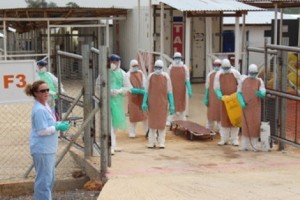
It isn’t until you arrive at Save the Children’s Ebola Treatment Centre in Kerry Town that you start to really appreciate the scale of the operation, and the number of people involved in making sure that it runs safely.
Over 600 national and more than 100 international staff work in this specialist medical centre 24 hours a day, seven days a week.
Most of the staff fall under two teams: Clinical and WASH (Water, Sanitation and Hygiene). The Clinical teams include national and international doctors and nurses from Sierra Leone and countries all over the world, including the UK.
A vital role
WASH teams are made up of hygienists, many of whom come from the local area. Very few of them have done anything like this before. Some used to be farmworkers or university students, others were schoolteachers and musicians.
Now they’re responsible for everything from donning personal protective equipment to decontaminate people as they leave the Ebola patient wards, to making sure we have enough chlorinated water at the facility, cleaning up spills, and washing aprons and goggles in chlorine ready to be used again.
It’s an important role and, with such a wide range of experience and responsibilities among the staff, it’s absolutely vital we train everyone working at the ETC on the Ebola virus, how to work safely and how to keep the facilities clean and safe. To date, we’ve trained over 550 people in how to safely operate in personal protective equipment.
“Training adults is very different to teaching children” says Alie, one of the trainers who used to be a teacher in a nearby town but has been working at the ETC since the schools closed due to the epidemic. “I enjoy working with all the different backgrounds of people that we train; we have to be ready to train new staff working in all areas of the centre, from the red zone Ebola wards to the laundry.”
Touched by Ebola
Every member of our staff working in Kerry Town has been touched by Ebola in some way – whether they are survivors, have lost loved ones or are waiting for schools and universities to reopen. It’s a stark reminder of just how much this virus has spread throughout West Africa and the effect it has had on those living here.
The number of new cases in Sierra Leone is falling, but there is still a lot of work to be done. We have a fantastic team of highly trained staff in Kerry Town. Now, the challenge is to make sure these skills are not lost but can be turned to infection prevention and control to prevent future outbreaks. If we succeed, the people of Sierra Leone have a future to look forward to.
Donate to Save the Children’s fight against ebola here
Article courtesy of Save the Children written by Clara Hawkshaw
